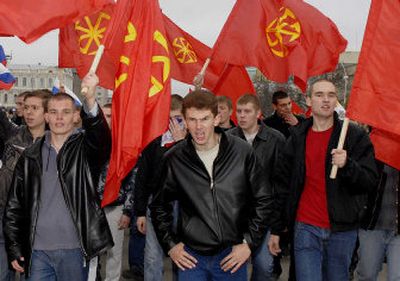National Unity Day spawns divisive rallies across Russia

MOSCOW – Ultranationalists staged marches in cities across Russia on Saturday as far-right activists and their critics tussled over what kind of symbolism to attach to the country’s new National Unity Day holiday.
About 4,000 demonstrators gathered in a Moscow square for a rally where they shouted, “Russia for Russians” and anti-Semitic slogans. More than 1,000 police stood guard nearby. The protesters then left the square for a march, which had been banned, and police detained dozens of people, mainly those carrying flags or banners.
A Russian journalist was hit several times in the face by a protester as the ultranationalists gathered, the Russian news agency RIA Novosti reported. A suspect was arrested, it said.
Rally organizers charged that police beat some protesters while detaining them. More than 200 protesters were detained on their way to the rally, RIA Novosti said, quoting a police source.
In St. Petersburg, police used tear gas to break up a fistfight on the city’s main street between about 200 ultranationalist marchers and a group of leftist activists, the Russian news agency Interfax said. About 10 participants in a banned march in the Siberian city of Novosibirsk were detained for questioning, according to Interfax.
Last year, ultranationalists staging a march to mark the first year of the new holiday gave the Nazi salute and shouted “Heil Hitler.” That prompted public criticism resulting in a decision this year by authorities in Moscow and many other cities to ban such marches.
Kremlin authorities designed the National Unity Day holiday to replace the traditional Nov. 7 celebration of the 1917 Bolshevik Revolution. Since the 1991 collapse of the Soviet Union, Communists had marked the Nov. 7 holiday with protests against policies that have led to a sharp increase in the gap between rich and poor.
The new holiday is pegged to Moscow’s liberation in 1612 from Polish invaders, helping ultranationalists to imbue it with sentiment against non-Russian ethnic groups, even though those who designed it meant to stress the unity of all Russian citizens.
Saturday’s ultranationalist rally in Moscow was allowed to take place because the small right-wing People’s Will party had received a demonstration permit, and then larger groups that had been unable to obtain permission for a rally or march joined that event.